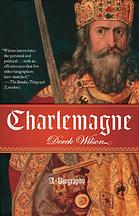
Charlemagne
The Great Adventure
کتاب های مرتبط
- اطلاعات
- نقد و بررسی
- دیدگاه کاربران
نقد و بررسی

March 13, 2006
Christian warrior, scholar prince, pilgrim saint and emperor, Charlemagne (742–814) has influenced modern rulers from Napoleon to Charles de Gaulle. As acclaimed British historian Wilson (Tudor Tapestry: Men, Women, and Society in Reformation England
) points out in this fast-paced biography, the Frankish king who was named emperor by the pope brought civilization and peace to Europe in the Early Middle Ages. An acquisitive king intent on expanding Francia's borders and connecting politics and religion, Charles the Great, according to Wilson, is responsible for the shape of Europe as we know it today. Wilson deftly chronicles Charlemagne's military exploits, political intrigues and religious devotion. In addition to his military leadership, the emperor initiated a revival of humane learning (the Carolingian Renaissance) and the establishment of a clerical hierarchy that could preach, administer the sacraments properly and oversee matters of the empire. Although, as Wilson points out, Charlemagne's sometimes megalomaniacal personality drove his armies to the brink of disaster, he fostered a unity and a culture in his empire that have lasted to modern times. Maps.

May 1, 2006
Wilson ("The Uncrowned Kings of England" struggles to provide a balanced account of an undeniably significant figure in European history. Charlemagne (742 -814) waged fierce perpetual warfare during his reign; the ruthless aggrandizement of territory and the promise of loot were the main ingredients of Carolingian conquests. Yet the reader -like Wilson himself -cannot help but admire Charlemagne. He left a legacy of European cohesion that has yet to be emulated by the European monarchs, dictators, and even liberal leaders who have embraced him. Most important, Charlemagne provided the basis for Western cultural life. More than a few historians do not consider Charlemagne to be -The Father of Europe - (e.g., Jacques Le Goff in "The Birth of Europe". For a more balanced account, libraries should consider Matthias Becher -s "Charlemagne" Despite his obvious point of view, Wilson writes with clarity and passion, and his thesis is food for thought for both general readers and students. Recommended for all comprehensive European history collections." -Jim Doyle, Rome, GA"
Copyright 2006 Library Journal, LLC Used with permission.

August 1, 2006
Adult/High School -A fascinating introduction to the ruler and his world. Several features help readers navigate this complicated era. A genealogy of the Carolingian dynasty helps keep track of Charlemagne -s large family. A time line from his birth (742) to the division of his empire (843) lists significant events in Francia, the Byzantine Empire, Western Christendom, and the Islamic world. Nine maps trace the changes in the borders of the empires and the routes of invaders, and 16 pages of color pictures show how legends about Charlemagne captured the attention of artists and craftsmen through the ages. Using a variety of primary and secondary sources, Wilson -s account reads like an adventure story. The author comments on the reliability of his sources even as he faithfully quotes them. Charlemagne -s intellectual pursuits, his ideas about faith, and his visions for his empires are also covered. Wilson shows how Charlemagne -s image changed after his death and over the centuries. Sometimes, he was revered as the world -s greatest warrior; at other times, as a saint or a philosopher king. Each age re-created him in a new light, and Wilson demonstrates how the empire he built led to the development of the European identity." -Kathy Tewell, Chantilly Regional Library, Fairfax County, VA"
Copyright 2006 School Library Journal, LLC Used with permission.

May 1, 2006
The British author of popular royal histories explores the life of Charles the Great, whose empire fractured following his death in 814. Yet its reputation redounded through time as an example of civilized, militant, unified Christendom, wedged as it was between the Dark and the Middle Ages. Wilson's interpretation of the long-lived, peripatetic king of the Franks intelligently draws upon the Frankish chronicles and a contemporary biography, converting them into a fluent narrative that views events, from one campaigning season to the next, as a conventional dynastic/territorial dynamic that gained religious impetus as Charlemagne chastised Germanic pagans, stood guard against Islamic Spain, and competed for Christian ascendancy with the Byzantine Empire. Wilson embroiders Charlemagne's actions with the broad-minded personality that has come down to us: Charlemagne may have beheaded thousands, but he also kept his scriptoria busy, preserving many texts from oblivion. Concluding with the symbolic uses made of Charlemagne from the Crusades to Charles de Gaulle, Wilson successfully regales readers with this crucial figure in European history.(Reprinted with permission of Booklist, copyright 2006, American Library Association.)

























دیدگاه کاربران